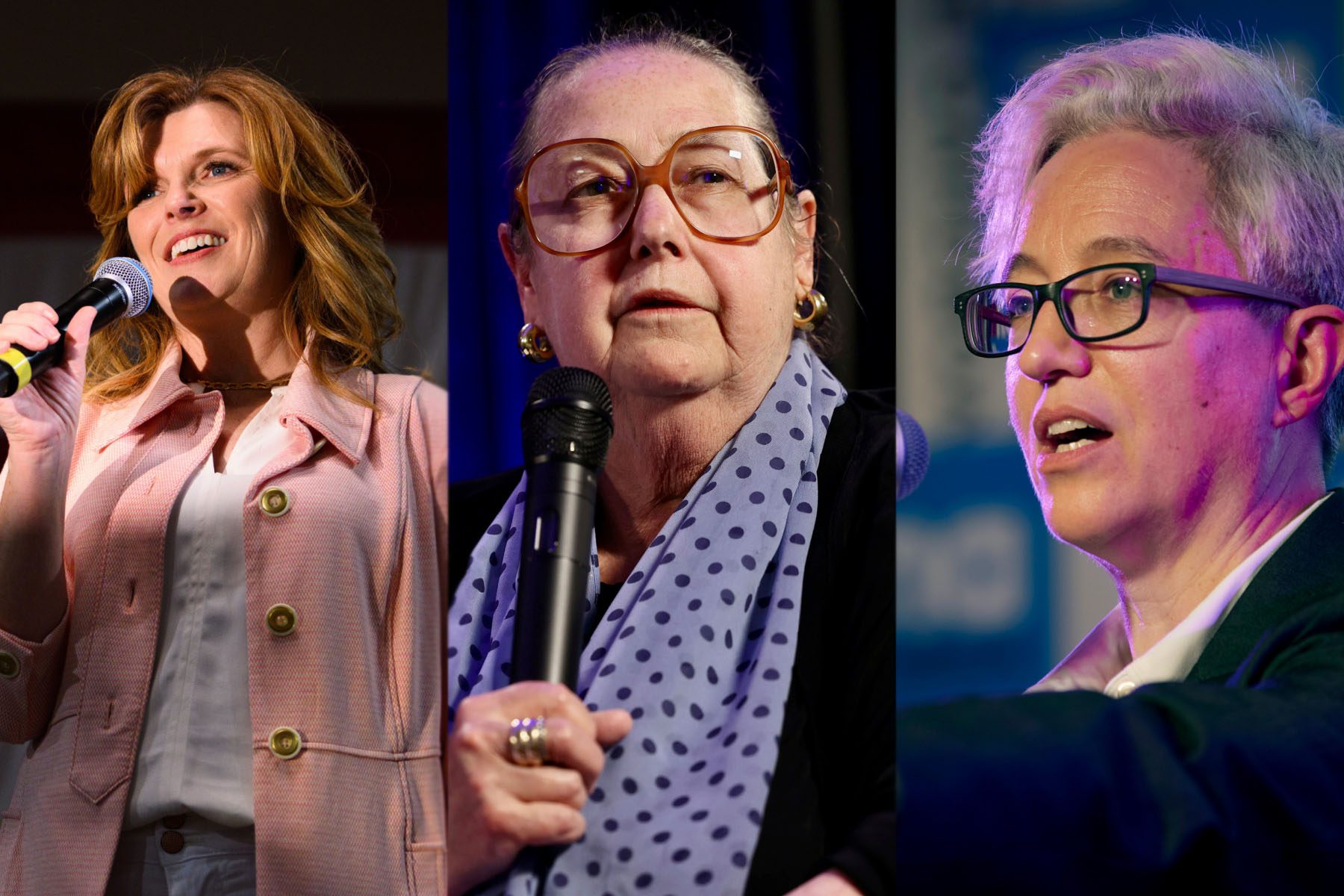While 19 states have never elected a woman governor, Oregon has elected two women to the job — including the current governor. Its next governor will also be a woman. She’s spent years in the state’s legislative body. Her politics also differ greatly from her competitors.
But whether she is Republican Christine Drazan, Democrat Tina Kotek or the third-party candidate Betsy Johnson will have very different political consequences. The outcome of the country’s first known competitive three-woman governor’s race could disrupt a West Coast alliance on abortion access and threaten LGBTQ+ rights within a progressive state — or see the country’s first openly lesbian governor elected.
Drazan is still polling slightly ahead of Kotek, maintaining an edge she’s held since early October, according to FiveThirtyEight’s running average of polls. (A Civiqs poll released Thursday puts Kotek’s odds much higher.) Johnson, while unlikely to win, cannot be fully ruled out, either. That has worried national Democrats; President Joe Biden last week flew in to rally Democratic support in the state, which hasn’t elected a GOP governor in four decades.
Experts say the historic race exemplifies what research has shown for years: Women in politics, and women voters, are not a monolith, including on vital issues like abortion access. The close race also serves as an example of a growing trend across the country — more women are running for an office that has historically shunned them. A record 25 women are running as major-party nominees for governor this year, according to the Center for American Women and Politics (CAWP).
Across states and at the federal level, the title of chief executive has been one of the final glass ceilings for women in political office, as stereotypes about what kind of leaders women should have persisted, said Debbie Walsh, director of CAWP. Women are assumed to be good collaborators or politicians who work “across the aisle” — not the place where the buck stops, she said.
All three women have highlighted their records in the state legislature to make their case to voters. Kotek, the first out lesbian speaker of any state legislature in the United States, served in that role in the Oregon House from 2013 until this year. Drazan was state House minority leader in 2019, the same year she took office. Johnson was a member of the Oregon state Senate from 2007 until 2021.
Despite all candidates prioritizing other issues as more pressing for Oregon — homelessness, schools, the economy — abortion has become a flash point in the race.
-
More from The 19th
- The midterms, a milestone and the myth of the monolith: How 2022 could build on women’s representation
- ‘My body is not yours’: How personal abortion stories are taking center stage in Democratic campaign ads
- Kyra Harris Bolden will be the first Black woman on Michigan’s Supreme Court
The divisions were on display in the last debate of the campaign Wednesday, when Drazan doubled down on a pledge she’s made in several interviews: that abortion access in Oregon won’t change if she’s elected. This time, she went further, saying that people from outside the state seeking abortions within Oregon should still be able to do so while she’s in office — as long as public funds aren’t being used.
It’s a key promise because while Kotek and Johnson are on record supporting abortion access, Drazan, endorsed by Oregon Right to Life, opposes it, citing her faith as the core reason.
At the debate, Kotek responded by saying she believed Drazan would ban abortion if elected, despite her opponent’s repeated statements to the contrary — prompting Drazan to accuse Kotek of lying to voters. Johnson, who cites abortion access as the core reason she left the Republican Party, took the opportunity to defend her lack of endorsement from Planned Parenthood as an unaffiliated candidate.
Drazan supports abortion restrictions in the third trimester and told Oregon Public Broadcasting that she would veto “legislation that would put Oregon further outside the mainstream on abortion policies.” In an interview last month with The Bulletin, a daily newspaper in Oregon, Drazan reflected that pursuing a fight to change Oregon’s abortion laws — which she said she probably would not do within her first term as governor — would likely be moot.
“I didn’t run for governor to change Oregon’s abortion laws,” she told The Bulletin’s editorial board. “And we have Democrat legislatures and it’s very unlikely that they’ll move anything to the governor’s desk. … It’s already law. It’s already settled law in Oregon.”
Drazan’s campaign has not focused on abortion as a key issue, frequently naming homelessness, criminal justice and schooling as higher-priority issues. Axios reported in August that her campaign website has been scrubbed of any reference to her endorsement by Oregon Right to Life, similar to moves by other GOP candidates across the country who have tried to shy away from hard anti-abortion stances.
Kotek, like other Democratic gubernatorial candidates this year, has taken a more direct approach, releasing several ads targeting Drazan’s stance on abortion and accusing her of hiding her “real agenda” — banning abortion in the state. Planned Parenthood’s Oregon PAC, which has endorsed Kotek, has amplified that message.
Abortion is currently legal at all stages of pregnancy in Oregon and the current governor, Kate Brown, pledged alongside California and Washington state this summer to expand abortion access and protect people from out-of-state who seek abortions in their states.
A win by Drazan would break the West Coast’s streak of pro-abortion state leaders. That the person with the potential to disrupt such a deeply blue state, and to become Oregon’s first GOP governor in decades, is a woman, only further defies stereotypes of women in politics, experts say.
“Women don’t vote as a voting bloc,” said Alison Gash, associate professor of political science at the University of Oregon. A significant number of White, non-college-educated women vote consistently Republican — and conservatives like Drazan have done well courting them this year, she said.
Outside of legislative or constitutional protections, Drazan could still use her limited executive powers as governor to make accessing abortions harder within the state, Gash said. Withholding state funds that go to providers of reproductive services would be one option, or adding new requirements for providers to access those funds, she said. Litigation would likely follow such policy proposals. When asked if she would veto budgets allocating money to abortion advocacy groups, Drazan told Oregon Public Broadcasting her concern “is with how the money is used, not with the organizations themselves.” She would examine all budgets to determine if they are “advancing a political agenda,” she added.
“She understands that she’s running in a state where most voters are decidedly pro-choice. And so running openly on an anti-choice ticket isn’t going to win her over the middle-of-the-road voters that she needs,” Gash said.
Women politicians have a unique advantage when discussing abortion in their campaigns, experts say — they can speak from experience, or speak to how such policies would impact their own lives. While transgender men and nonbinary people can get pregnant and are disproportionately affected by abortion bans, there are barely any nonbinary candidates in the country to share that kind of personal view on the campaign trail — and even fewer trans men.
“It is often women who can speak on this issue from the most authentic point of view,” said Kelly Dittmar, associate professor of political science at Rutgers University and director of research at CAWP. “Voters might trust women more on an issue like this because they are themselves subject to whatever these policies are in a very direct way.”
On LGBTQ+ rights, Johnson, who served in the Oregon state Senate as a Democrat, supports banning transgender girls from competing with other girls in school sports, as does Drazan. Kotek, who would be the first out lesbian governor in the country if elected — a history-making title that may also go to Democrat Maura Healey in Massachusetts — opposes bans on trans students in school sports.
Gash, who researches civil rights and legal battles for LGBTQ+ rights, is concerned about what the outcome of the governor’s race will mean for transgender and LGBTQ+ rights in Oregon — and that voters aren’t aware of the stakes.
Preventing trans students from joining same-gender athletic teams could be done via executive action, she said — as could other rules affecting the state’s education system. South Dakota Gov. Kristi Noem, a Republican, took a similar route last year, banning trans girls from school sports through executive order.
“I also worry about some form of ‘Don’t say gay’ being implemented or supported,” she said. Although schools in cities like Portland and Eugene are known to be LGBTQ-friendly, areas like Newberg — where the school board voted last year to ban teachers from displaying Pride flags — are another story.
“I think having a governor like Christine Drazan would only catalyze, would only expand those kinds of efforts,” Gash said.
Drazan and Johnson’s campaigns did not respond to interview requests ahead of Wednesday’s debate, and Kotek’s campaign said she was not available for an interview. Mail-in ballots in Oregon began being sent out Wednesday.







